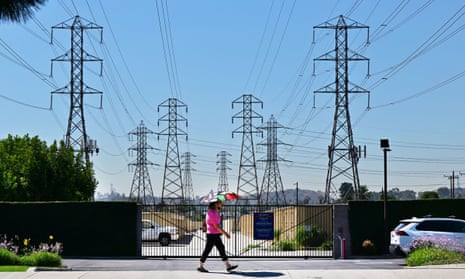‘People need to be riled up’: meteorologist names US heatwaves after oil and gas giants
Guy Walton has christened two previous heatwaves this summer Amoco and BP in attempt to name and shame fossil fuel firms

The summer’s heatwaves have been so blistering they have inspired their own names. In Europe they have been called nightmarish figures from Greek mythology, but one meteorologist in the US has taken a more pointed approach – by naming the country’s heatwaves after the oil and gas companies that have worsened the climate crisis.
The heatwave that has baked much of the US south-west in recent weeks, helping bring a record-breaking string of days over (43C) 110F to Phoenix, has been named Heatwave Chevron by Guy Walton, a veteran former Weather Channel meteorologist.
Walton, who now runs a blog on weather as well as writing a range of children’s books he calls “Harry Potter meets the climate crisis”, has already christened two previous heatwaves this summer Amoco and BP, after two other oil companies.
The rebadging of heatwaves as being directly the fault of companies like Chevron is “a naming and shaming thing”, according to Walton, who wants weather forecasters and the media to be more explicit between the links between extreme heat and the burning of fossil fuels that has caused the climate crisis.
“I’m trying to be a bug in the ear of my compatriots to take what I’m doing and run with it,” he said. “I realize what I’m doing is controversial and corporate media will want to steer clear of it, but people need to be riled up. I don’t think we need to pull any punches. If it causes consternation, so be it.”
Walton has devised his own criteria for named heatwaves in the US, based on duration and extremity, on a one to five scale similar to hurricanes. Heatwave Chevron is classed as a four and is “historic”, Walton said. The meteorologist said he has a list of 20 oil and gas companies – including Exxon and Shell – for upcoming heatwaves and will turn to coal companies if he runs out of names.
“It’s a little tongue-in-cheek but it’s not a fun topic, I want to galvanize the way the public thinks about these threats,” said Walton, who previously named heatwaves after dragons (a heatwave in Europe blamed for 60,000 deaths last year was named Smaug, after the antagonist in JRR Tolkien’s novel The Hobbit).
“It would be great if the media started naming heatwaves, although I’d expect them to use a more buttoned-up criterion than what I’ve used,” he added.
Although extreme heat is the deadliest weather phenomenon in the US and many other countries, there is no standardized naming system for heatwaves, unlike hurricanes that are routinely named after people – Atlantic storms this year will be given monikers including Emily, Cindy and Sean.
The World Meteorological Organization, comprising 121 governments, has said it has no plans to alter this status quo, pointing to the lack of an agreed definition of heatwaves and the perceived danger that names would “misdirect” public and media attention away from important messages on how to cope with a blast of dangerous heat.
A wave of record heatwaves has, however, forced a rethink in some quarters. Last year, authorities in Seville, Spain, started naming heatwaves – one, called Zoe, reached 43C (109F) – and this summer an Italian weather website has turned to mythological figures to name some of the fiercest heat the continent has ever seen.
Two major heatwaves that have affected southern Europe with temperatures as high as 48.8C (119F) have been named Cerberus, the ferocious three-headed hound belonging to Hades, and Charon, the ferryman of Hades, the Greek underworld. The names have caught on with several media outlets and prompted some calls for change among meteorologists.
“I can see a benefit to giving heatwaves names, to help people understand them and make them memorable,” said Chris Gloninger, who had a long career as a TV meteorologist in the US before quitting after receiving a death threat for mentioning climate change on air.
“But I’d have a concern about naming them after oil companies,” he added. “It’s already such a politicized issue and it would give people dismissive about climate change more ammunition. I’d fear it would turn people off.”
Some climate campaigners, though, see a benefit in directly linking oil companies to the escalating climate disasters currently unfolding around the world. “I think it’s a great idea,” said Margaret Klein Salamon, a psychologist and executive director of the Climate Emergency Fund.
“Any kind of extreme weather should be named after the fossil fuel companies. It’s a brilliant way to bypass media silence and denial, and get the message to the public. We are in a climate emergency, and the fossil fuel industry is to blame.”
Chevron did not respond to a request to comment about being named after a heatwave that Walton said is now shifting eastwards. “I’m sure it will be responsible for about 100 deaths, it’s got a while to go yet,” he said.”
No comments:
Post a Comment